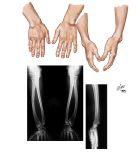I share my office (office may actually be a little too big a word for this 8-10 m2 room) at work with two master students. One of them hasn’t been around for the last couple of months as she is studying for an exam that she needs to pass in January in order to formally be able to finish her master's.  The other student, P, is just about to finish her thesis. However, she is pregnant and due to give birth by the end of December, and all of the medical appointments she has to go to (she has Leri-Weill syndrome and Madelung’s deformity (see picture to the left), and during pregnancy her thyroid gland has been getting sloppy, requiring several tests and endocrinological follow-ups, and now medication too), means that she will not be able to hand in her thesis until after the baby is born. We have shared office for years, struggling with our different projects and thesis, and even when I finished my master’s last year and got employed as a research assistant within the group, I kept my desk in this office despite it officially being reserved for students (our group is very space-constrained with only 3 of our 6 principle investigators, as well as our secretary, not sharing their offices. Everybody else shares, usually 4-6 people in each office). P and I have helped each other a lot during the years, both in scientifically oriented issues and in personal issues. She has become quite skilled in spotting if I am heading towards a low, and know how to deal with it if I am not able to myself.
The other student, P, is just about to finish her thesis. However, she is pregnant and due to give birth by the end of December, and all of the medical appointments she has to go to (she has Leri-Weill syndrome and Madelung’s deformity (see picture to the left), and during pregnancy her thyroid gland has been getting sloppy, requiring several tests and endocrinological follow-ups, and now medication too), means that she will not be able to hand in her thesis until after the baby is born. We have shared office for years, struggling with our different projects and thesis, and even when I finished my master’s last year and got employed as a research assistant within the group, I kept my desk in this office despite it officially being reserved for students (our group is very space-constrained with only 3 of our 6 principle investigators, as well as our secretary, not sharing their offices. Everybody else shares, usually 4-6 people in each office). P and I have helped each other a lot during the years, both in scientifically oriented issues and in personal issues. She has become quite skilled in spotting if I am heading towards a low, and know how to deal with it if I am not able to myself.
A couple of months ago P and her husband moved to Vejle, where her husband works. This causes P to have a 60-75 min commute to and from the university every day. The medical appointments she has to attend often causes her to take the whole day off because they may be situated in the middle of the day so that she would only be able to spend a couple of hours in the lab before or afterwards. This is of course not practical with this commute, so these days she will often be working at home, reading articles or analyzing spectra. Sometimes, though, these days away will interrupt the experiments that she needs to do in the lab, setting her back more than just the single day that she is actually off. Because of this we have an agreement that she just has to tell me and maybe leave a note on my table, if I am to take care of an experiment for her (e.g. dry down some samples, start or end an enzymatic digest, etc.), so that she can just continue the series of experiments when she is back in the following day. I don’t mind doing this. It usually doesn’t take much time for me, but it saves her at least a day, so I think that it is the least I can do. She is grateful for this, and because she knows that I am a chocolate lower, she usually gets me a piece of chocolate in thanks.
 Handing me the chocolate this morning she told me that she just heard on TV last night that dark chocolate may actually be good for diabetics. Two different programs on two different TV channels had sent that message through. Dark chocolate should apparently be able to increase the insulin sensitivity of muscles, thereby assisting in lowering the BG. I have heart many good thinks about chocolate, and dark chocolate in particular, during the last few years, but never anything specifically related to diabetes, so I was a bit surprised though pleased that food research may actually justify my occasional craving for chocolate :-) I entered “diabetes + “dark chocolate”” into Google, and got an amazingly 261,000 hits! I didn’t really find anything new, though, but I did find a couple of sites that stated the link between dark chocolate and the proposed improvement of glucose metabolism although the main effect seems to be lowering of blood pressure and not blood sugar (ooh!). Amy at Diabetes Mine had a post about this about a year ago too where she also points out that the experiments leading to these conclusions were actually done on healthy, non-diabetic individuals with some degree of hypertension. Now I am just wondering why all of a sudden the possible positive effect of dark chocolate has reached the Danish media again more than a year after this research first made headlines (here in Denmark too), and now even focusing more on the effect for diabetes?
Handing me the chocolate this morning she told me that she just heard on TV last night that dark chocolate may actually be good for diabetics. Two different programs on two different TV channels had sent that message through. Dark chocolate should apparently be able to increase the insulin sensitivity of muscles, thereby assisting in lowering the BG. I have heart many good thinks about chocolate, and dark chocolate in particular, during the last few years, but never anything specifically related to diabetes, so I was a bit surprised though pleased that food research may actually justify my occasional craving for chocolate :-) I entered “diabetes + “dark chocolate”” into Google, and got an amazingly 261,000 hits! I didn’t really find anything new, though, but I did find a couple of sites that stated the link between dark chocolate and the proposed improvement of glucose metabolism although the main effect seems to be lowering of blood pressure and not blood sugar (ooh!). Amy at Diabetes Mine had a post about this about a year ago too where she also points out that the experiments leading to these conclusions were actually done on healthy, non-diabetic individuals with some degree of hypertension. Now I am just wondering why all of a sudden the possible positive effect of dark chocolate has reached the Danish media again more than a year after this research first made headlines (here in Denmark too), and now even focusing more on the effect for diabetes?
1 comment:
It is so nice to have friends like P AND it is nice she has YOU!
Post a Comment